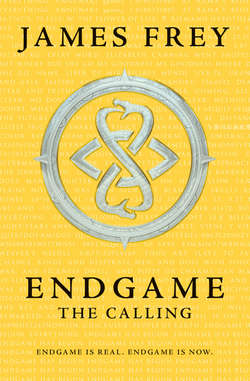Читать книгу The Calling - Джеймс Фрей, James Frey, Nils Johnson-Shelton - Страница 10
CHIYOKO TAKEDA 22B Hateshinai Tōri, Naha, Okinawa, Japan
ОглавлениеThree chimes of a small pewter bell awake Chiyoko Takeda. Her head lolls to the side. The time on her digital clock: 5:24. She makes a note of it. These are heavy numbers now. Significant. She imagines it is the same for those who ascribe meaning to numbers like 11:03 or 9:11 or 7:07. For the rest of her life she will see these numbers, 5:24, and for the rest of her life they will carry weight, meaning, significance.
Chiyoko turns from the clock on her side table and stares into the darkness. She lies naked on top of the sheets. She licks her full lips. She scrutinizes the shadows on her ceiling as if some message will appear there.
The bell should not have rung. Not for her.
All her life she has been told of Endgame and her peculiar and fantastical ancestry. Before the bell rang, she was 17 years old, a homeschooled outcast, a master sailor and navigator, an able gardener, a limber climber. Skilled at symbols, languages, and words. An interpreter of signs. An assassin able to wield the wakizashi, the hojo, and the shuriken. Now that the bell has rung, she feels 100. She feels 1,000. She feels 10,000, and getting older by the second. The heavy burden of the centuries presses down upon her.
Chiyoko closes her eyes. Darkness returns. She wants to be somewhere else. A cave. Underwater. In the oldest forest on Earth. But she is here, and she must get used to it. Darkness will be everywhere soon, and everyone will know it. She must master it. Befriend it. Love it. She has prepared for 17 years and she’s ready, even if she never wanted it or expected it. The darkness. It will be like a loving silence, which for Chiyoko is easy. The silence is part of who she is. For she can hear, but she has never spoken.
She looks out her open window, breathes. It rained during the night, and she can feel the humidity in her nose and throat and chest. The air smells good.
There is a gentle rapping on the sliding door leading to her room. Chiyoko sits in her Western-style bed, her slight back facing the door. She stamps her foot twice. Twice means Come in.
The sound of wood sliding across wood. The quiet of the screen stopping. The faint shuffle of feet.
“I rang the bell,” her uncle says, his head bowed low to the ground, according the young Player the highest level of respect, as is the custom, the rule. “I had to,” he says. “They’re coming. All of them.” Chiyoko nods.
He keeps his gaze lowered. “I am sorry,” he says. “It is time.”
Chiyoko stamps five arrhythmic times with her foot. Okay. Glass of water.
“Yes, of course.” Her uncle backs out of the doorway and quietly moves away.
Chiyoko stands, smells the air again, and moves to the window. The faint glow from the city’s lights blankets her pale skin. She looks out over Naha. There is the park. The hospital. The harbor. There is the sea, black, broad, and calm. There is the soft breeze. The palm trees below her window whisper. The low gray clouds begin to light up, as if a spaceship is coming to visit. Old people must be awake, Chiyoko thinks. Old people get up early. They are having tea and rice and radish pickles. Eggs and fish and warm milk. Some will remember the war. The fire from the sky that destroyed and decimated everything. And allowed for a rebirth. What is about to happen will remind them of those days. But a rebirth? Their survival and their future depend entirely on Chiyoko.
A dog begins to bark frantically.
Birds trill.
A car alarm goes off.
The sky gets very bright, and the clouds break downward as a massive fireball bursts over the edge of town. It screams, burns, and crashes into the marina. A great explosion and a billow of scalding steam illuminate the early morning. Rain made of dust and rock and plastic and metal hurls upward over Naha. Trees die. Fish die. Children, dreams, and fortunes die. The lucky ones are snuffed out in their slumber. The unlucky are burned or maimed.
Initially it will be mistaken for an earthquake.
But they will see.
It is just the beginning.
The debris falls all over town. Chiyoko senses her piece coming for her. She takes a large step away from her window, and a bright ember shaped like a mackerel falls onto her floor, burning a hole in the tatami mat.
Her uncle knocks on the door again. Chiyoko stomps her foot twice. Come in. The door is still open. Her uncle keeps his gaze lowered as he stops at her side and hands her first a simple blue silk kimono, which she steps into, and, after she’s in the kimono, a glass of very cold water. She pours the water over the ember. It sizzles, spurts, and steams, the water immediately boiling. What is left is a shiny, black, jagged rock. She looks at her uncle. He looks back at her, sadness in his eyes. It is the sadness of many centuries, of lifetimes coming to an end. She gives him a slight bow of thanks. He tries to smile. He used to be like her, waiting for Endgame to begin, but it passed him over, like it did countless others, for thousands and thousands of years.
Not so for Chiyoko.
“I am sorry,” he says. “For you, for all of us. What will be will be.”
